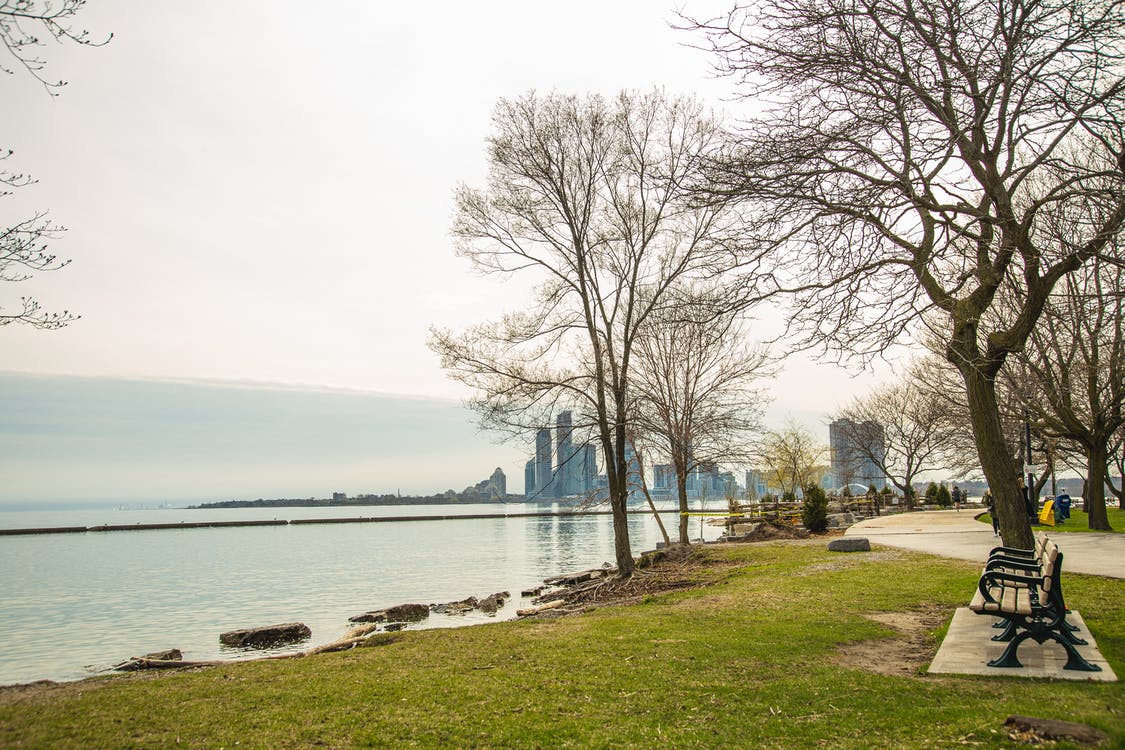The last free-standing synagogue in Detroit is growing fast — and set for a $5 million renovation

When Jay Hack and his wife moved to a long-blighted but fast-revitalizing section of Detroit 10 years ago, they joined the Isaac Agree Downtown Synagogue. It’s the last freestanding shul in the city, and happens to be named for his great-great-grandfather.
The building, with its two bold rows of brightly colored glass windows, both charmed and repelled them.
“The first services we went to, I brought my oldest son and he was literally crawling on the floor and we had to guide him away from broken glass,” said Hack, a 45-year-old financial planner who grew up in the Detroit suburbs.
But now Hack and the growing congregation are weeks away from the start of a $5 million renovation of Isaac Agree, necessitated by a sharp recent influx of young Jewish residents and their growing families. Construction is set to begin in early June on the synagogue, which was once one of at least 40 in Detroit before a mass midcentury exodus to the suburbs doomed them.
The plan is to transform it from a decrepit structure into a gleaming, modern hub of Jewish life in southeastern Michigan — a stunning turnaround for a 100-year-old congregation too small to afford a rabbi or staff just a few years ago. It’s a rare but not unheard of renaissance for an urban synagogue; in Washington, D.C., one sold to a church midcentury became part of the center city’s renewal in 2004 when it was rededicated as the 6th & I Historic Synagogue.
After the work is completed, several major Jewish groups in the metro Detroit region are expected to rent workspace in the building as they re-establish themselves in the city after decades in the suburbs. They’ll be joining a reverse migration that has transformed much of Detroit. Around Isaac Agree in the past 10 years, scores of companies have located or relocated tens of thousands of finance and tech jobs to the city. Simultaneously, developers have renovated or converted dozens of apartment buildings for the growing workforce of young professionals.
“I like to call us a 100-year-old startup,” said Rabbi Ariana Silverman, who was hired in 2016. “In many ways, we’re both a synagogue that’s been around for 100 years and we’re an organization that’s growing incredibly quickly and trying to do new and bold things at the same time.”
Back to the Future
The ambitious construction plan includes a remodeled sanctuary; a refurbished social hall and catering area; office space on the third and fourth floors which are currently condemned and unusable; and a rooftop space for weddings and other events. The refurbishment will accommodate a congregation that grew from fewer than 100 households a decade ago to more than 400 now, and from just 10 children under 18 to more than 100. While Silverman has only hosted two b’nai mitzvah so far in her six-year tenure, the temple’s new religious school already has 10 enrollees.
“Many congregations are struggling to get people in their 20s and 30s to be involved and certainly to join, and that actually is one of our primary demographics, which is kind of cool,” Silverman said. “The appeal is building a space that’s going to engage the next generations of Jews.”
The project was expected to cost the $4.5 million raised in a capital campaign that launched in 2020, but Silverman said the cost has spiraled to about $5.9 million thanks to the recent spike in inflation and the construction industry’s supply chain issues.
They’re turning back to their larger donors – Michigan-based Jewish-oriented groups including William Davidson Foundation, the Gilbert Family Foundation, the Fisher Foundation, and the Kahn Foundation — to ask for larger gifts, but for the moment the construction has been pared back somewhat — no rooftop space or fourth-floor offices, for instance — as the work is scheduled to begin on June 7. It’s due to be completed in January.
“We’ll do the floors and walls of the fourth floor and have the elevator go to the roof so that the full vision can be realized at some point,” Silverman said.
Rise and demise
Isaac Agree was founded in December 1921 by Nathan and Charles Agree, the namesake’s sons, as a nonprofit family charitable association in honor of their patriarch, a Russian émigré who came to Detroit in 1904. The association endowed an Orthodox religious school that grew into a synagogue in the city’s North End and moved in 1937 to a rented building in the Downtown business district. In 1964, the shul purchased its current location, a former men’s clothing store.
Back then, the shul — the only one Downtown — served as a place for observant Jews to pray on their way to or from work. “It’s always been a convenient-oriented synagogue for businessmen or whatever to come say Kaddish,” said Hack, a board member.
Wait! Don’t miss out on the latest insights
Sign up for Saschse Construction’s
e-newsletter below!
Featured Topics

